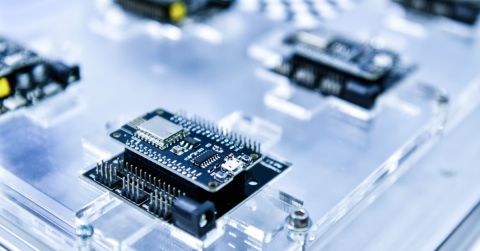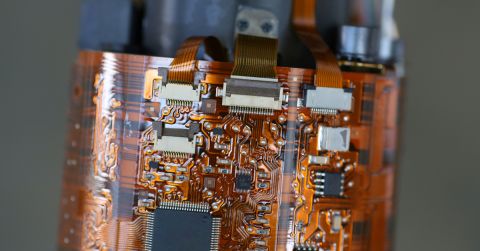AI-Enhanced Battery Management Systems for EVs
The electric vehicle (EV) revolution is well underway, with manufacturers and customers worldwide embracing a future characterized by electrified mobility. Battery management systems (BMS) are at the core of this shift, and as EVs become ever more prevalent, BMS capabilities must evolve and improve. Right now, artificial intelligence (AI) is leading the charge with BMS breakthroughs that are about to redefine how we monitor, control and optimize EV batteries.
A BMS is the brain of an EV's power system. Its primary functions include monitoring battery state (charge, health and temperature), balancing cell voltages, protecting against overcharging and over-discharging, managing thermal conditions and communicating battery status to vehicle systems. Traditionally, BMS relied on predetermined algorithms and models to perform these tasks. However, the integration of AI into BMS is opening up new possibilities for enhancing the performance and efficiency of EVs.
The AI Revolution in EV Battery Management
By utilizing machine learning algorithms and real-time data analysis, AI-enhanced BMS are advancing the capabilities of EVs. Several AI techniques are being employed, including neural networks, fuzzy logic, genetic algorithms and support vector machines. These capabilities enable AI-powered BMS to adapt to individual cell characteristics, predict potential failures before they occur, optimize charging and discharging in real time, extend battery life, and improve overall vehicle performance.
These AI capabilities offer several advantages over traditional BMS methods. According to a comprehensive study published in the journal Vehicles, AI techniques require less domain-specific knowledge about battery physics and chemistry, can handle large datasets efficiently and are better equipped to deal with uncertainties such as fluctuations in temperature and the effects of battery aging.
The integration of AI into BMS brings numerous benefits. AI algorithms can provide more precise estimations of battery state, leading to better overall performance. By analyzing patterns in battery data, AI can predict potential issues before they become critical, reducing downtime and maintenance costs. AI can determine the most efficient charging patterns, which extends battery life and reduces charging times. As a battery ages, AI can adjust parameters to maintain optimal performance throughout the battery's lifecycle. AI-enhanced BMS can also prevent catastrophic failures by quickly detecting and preventing safety issues, such as thermal runaway.

Challenges in Implementing AI-Enhanced BMS
While AI's potential in BMS is enormous, it's not without challenges. AI systems require large amounts of high-quality data to train effectively. Ensuring consistent, accurate data collection across diverse operating conditions is crucial and difficult. Running complex AI algorithms in real time can be computationally intensive, requiring powerful onboard processing that pushes the limits of today’s onboard vehicle computing systems.
Integrating AI into safety-critical systems like BMS also introduces new complexities in system validation. Ensuring that AI-driven decisions are always safe and optimal is a significant challenge. As AI systems become more prevalent in EVs, manufacturers and regulators will need to develop new frameworks to ensure their safe and ethical use.
Innovative Components for AI-Enhanced BMS
Several companies are at the forefront of developing the components enabling AI-enhanced BMS solutions. Let's take a quick look at a few of the most innovative products in this space from leading manufacturers:
NXP Semiconductors' MC33772C battery cell controller can accurately monitor and balance up to 14 series-connected battery cells. When integrated with NXP's S32K1 MCUs, it enables sophisticated algorithms for cell balancing, state-of-charge (SOC) estimation and fault detection. The system supports CAN FD (Controller Area Network Flexible Data-Rate) communication, allowing high-speed data exchange with the vehicle's central computer. This facilitates real-time adjustments and diagnostics, pushing the boundaries of what's possible in battery management.
Texas Instruments BQ79616-Q1 is a highly integrated battery monitor and protector that can monitor up to 16 series-connected battery cells with high accuracy. It supports advanced cell balancing and fault detection capabilities, which can be leveraged by AI algorithms implemented at the system level to enhance overall battery management. The BQ79616-Q1 also features a unique daisy-chain architecture that allows for easy scaling of a BMS for different battery pack configurations.
Analog Devices' ADAS3022 is a high-precision analog-to-digital data acquisition system that integrates an 8-channel multiplexer, a programmable gain amplifier, a precision reference and a 16-bit SAR ADC. It provides the accurate and reliable data necessary for AI-enhanced BMS by delivering precise voltage and current measurements. This data enables AI algorithms, implemented externally, to perform advanced SOC and SOH estimations, predictive maintenance and optimization of battery performance.
Powerful Trends Steering the Future of AI-Enhanced BMS
Looking ahead, we see many exciting developments on the horizon for AI-enhanced BMS:
1. Edge Computing: Moving AI processing closer to the battery cells can reduce latency and improve real-time decision-making. Tesla, for example, has developed custom AI chips for its vehicles to exploit this technology.
2. Federated Learning: With federated learning, AI models learn from distributed datasets without compromising data privacy, enabling fleet-wide optimizations. Companies like BMW and Volkswagen are investigating this technology to improve BMS performance across entire fleets of vehicles.
3. Quantum Computing: As quantum computers become available, they will likely revolutionize battery modeling and optimization and significantly improve BMS performance. Many companies, including IBM and Daimler, are already working on quantum computing applications for next-generation EV batteries.
4. Integration with Smart Grids: AI-enhanced BMS will likely play a crucial role in vehicle-to-grid (V2G) technologies, optimizing energy flow between EVs and the power grid. This will enable more efficient use of renewable energy while helping to stabilize smart grids during periods of peak demand.
5. Solid-State Battery Integration: As solid-state batteries become commercially viable and readily available, AI-enhanced BMS will need to adapt to manage these breakthrough new batteries. Companies like QuantumScape and Toyota are at the forefront of solid-state battery development, and their success could lead to the next generation of AI-powered BMS.
6. Advanced Thermal Management: New AI algorithms will continue to enable more sophisticated thermal management strategies, optimizing battery performance and longevity across different environmental conditions. This is particularly important for extreme climates and high-performance applications, such as all-electric Formula E race cars.
Realizing the Potential of AI in BMS
AI-enhanced battery management systems represent a major step forward in EV technology. By leveraging the power of machine learning and advanced data analysis, these systems will extend battery life, improve performance and enhance safety. And as BMS technology continues to evolve, we can expect to see even more innovative applications of AI in battery management.
However, realizing the full potential of artificial intelligence in BMS will require increased collaboration between automakers, battery manufacturers, EV designers and AI specialists. It will also call for the development of new approaches to system design, validation and regulation. As we navigate these challenges, one thing is clear: AI-enhanced BMS will play a starring role in the future of electric mobility.
For more influential technology trends defining the future of mobility, see our companion article, 5 Trends Impacting the Future of EV Design.










